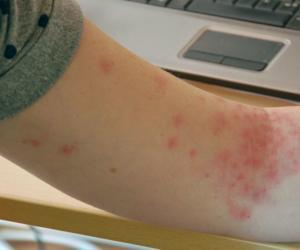“What's causing my hives?”
I've been getting hives along my arms, and they have been so itchy. I'm not really sure why. Do you think these hives could be from a food allergy or something similar?
3 Answers
InternistHives
There are so many reasons for hives or urticaria:
Recent illness (eg, fever, sore throat, cough, rhinorrhea, vomiting, diarrhea, headache)
Medication use including penicillins, cephalosporins, sulfas, diuretics, aspirin, nonsteroidal anti-inflammatory drugs (NSAIDs), iodides, bromides, quinidine, chloroquine, vancomycin, isoniazid, antiepileptic agents, and other agents
Intravenous radiocontrast media
Travel (amebiasis, ascariasis, strongyloidiasis, trichinosis, malaria)
Foods (eg, shellfish, fish, eggs, cheese, chocolate, nuts, berries, tomatoes)
New perfumes, hair dyes, detergents, lotions, creams, or clothes
Exposure to new pets (dander), dust, mold, chemicals, or plants
Pregnancy (usually occurs in last trimester and typically resolves spontaneously soon after delivery)
Sun or cold exposure
Exercise
So the history is everything. Avoidance of the precipitating factor is key. Loratadine, montelukast and ranitidine are a few agents that can be used. For more help, see a dermatologist or allergist.
Recent illness (eg, fever, sore throat, cough, rhinorrhea, vomiting, diarrhea, headache)
Medication use including penicillins, cephalosporins, sulfas, diuretics, aspirin, nonsteroidal anti-inflammatory drugs (NSAIDs), iodides, bromides, quinidine, chloroquine, vancomycin, isoniazid, antiepileptic agents, and other agents
Intravenous radiocontrast media
Travel (amebiasis, ascariasis, strongyloidiasis, trichinosis, malaria)
Foods (eg, shellfish, fish, eggs, cheese, chocolate, nuts, berries, tomatoes)
New perfumes, hair dyes, detergents, lotions, creams, or clothes
Exposure to new pets (dander), dust, mold, chemicals, or plants
Pregnancy (usually occurs in last trimester and typically resolves spontaneously soon after delivery)
Sun or cold exposure
Exercise
So the history is everything. Avoidance of the precipitating factor is key. Loratadine, montelukast and ranitidine are a few agents that can be used. For more help, see a dermatologist or allergist.
Hives are really tough! Our skin is the largest organ in our body, and as such, also holds many of the immune cells in our body as well. A rash on the skin generally means that the immune system is active against something, but often it may be very difficult to find out exactly what! Sometimes the rash is characteristic of particular illness, such as Chicken Pox. Other times, as you mention, exposure to items in the environment such as foods, skin products, or even the sun can cause these symptoms to occur. If you notice that when you eat specific foods, you develop a rash, that can be a very helpful tool to aid in the specific identification of your reaction. Sometimes a diary or other record keeping, along with photos of your rash, may be helpful for your physician to help sort out what is going





